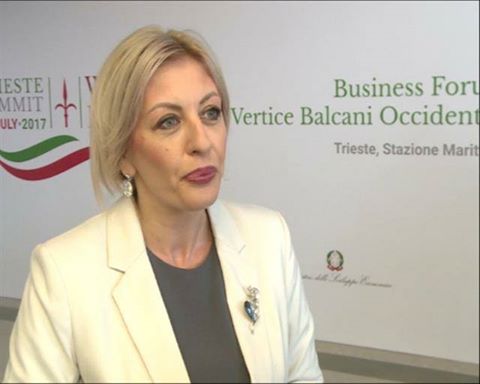
Ahead of the Trieste Summit within the framework of the Berlin Process, Minister of European Integration Jadranka Joksimović has said today that the Republic of Serbia has high level representatives at this meeting, that it is fully prepared, and that she is certain that some practical steps will be made and implemented after the Summit.
Joksimović pointed out that the Berlin Process had two dimensions, recalling that it had been initiated as part of the political process of connecting the Western Balkan countries, with a view to achieving common progress in the economy through better interconnectivity in infrastructure, transport, and energy sector, so as to create a better atmosphere for political communication and for better functioning of the entire region on its path to European integration.
“All of us are at different stages on this path. The Republic of Serbia is at a rather advanced stage of European integration, which is not the case with everyone else. That is why it was important for us to know that the Berlin Process is not a substitute for the actual European integration process, but rather a preparation for better economic and infrastructural interconnectivity of the region, which will also reduce political tensions”, said the Minister in a statement to Tanjug.
According to her, the other side of the Berlin Process, which the Trieste Summit is now more focused on, is how the state can provide better logistics for more investments and more new jobs through the development of the infrastructure and cooperation of governments in the region.
“That is what people are interested in”, Joksimović said, adding that the infrastructure must have some purpose.
In a short conversation with Commissioner for European Neighbourhood Policy and Enlargement Negotiations Johannes Hahn today, the Minister noted that energy and transport interconnectivity also implied better logistics for potential investors.
She recalled that the countries of the region, individually, were insufficiently interesting to investors, but that 20 million people did make a very important market, and that, in that sense, the role of the state, the government and everyone at the meeting was to provide better logistics for companies that want to invest in Serbia and open new jobs.
“The state itself cannot open new jobs, but it can provide better business conditions, reduce administrative barriers in the region so that we can do business better and in a less complicated way, and that we can cross borders more easily”, Joksimović explained.
The Minister reminded that the essence of European integration was deep integration, and that it required preparation, training and learning.
“I believe that we, in the region, can do this among ourselves and thus get better prepared. These are the components of the Berlin Process. I think that the focus is now back on the infrastructural interconnectivity, which is very good because it represents the logistics for new investments, employment, better connectivity of people”, she stressed.
The Minister added that the Republic of Serbia had shown its active participation, pointing out that the Prime Minister, the Minister of Finance, the Minister of Construction, Infrastructure and Transport, as well as she who was responsible for European integration and coordination of European funds, had all arrived at the Summit.
She said that it should be assessed which objectives were sustainable and realistic, and were of interest not only to Serbia but also to others in the region.
“This will make it better and easier to get more money from the European funds. If we make a realistic list of projects, and not a wish list, then we can acquire more money from the European funds, and that will be something the citizens of Serbia will feel the benefits of. That is what motivates us to actively participate here”, she stressed.
Joksimović noted that European Commissioner Hahn said that the European Commission would allocate additional resources and that we should be prepared with good projects, either in the field of road or energy infrastructure, or youth connectivity.
Source: Tanjug





